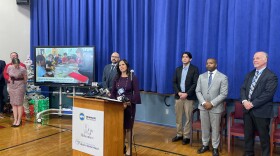Program advocates insisted competition would raise student achievement citywide. Generally, test scores of Milwaukee voucher and public school students remain low.
Alan Borsuk, a senior fellow at Marquette Law School and long-time education reporter, reviewed several sets of studies. The first, during the initial years of the Milwaukee Parental Choice program, were conducted by UW Professor John Witte.
"In the first years, most of his studies came back as negative to neutral, as to how kids in the voucher program were doing compared to MPS kids, and his reports were not too encouraging," Borsuk reports.
However, Witte also found that the program was popular with parents, so test scores did not appear to be their top priority.
After testing both voucher and MPS students at the start of the choice program, the state stopped testing the voucher schools.
"The schools were private schools and the theory of the program was - parents will choose and that will be our whole quality control. So the schools resisted taking part in state tests; they didn’t like the tests. Frankly, a lot of public schools, if they had the choice, wouldn’t take the test either, but they didn’t have the choice," Borsuk says.
State testing of voucher students resumed around 2010, and the participating schools must release the results publicly - by grade, not individual scores. Why did Wisconsin reinstate testing for choice students?
"Simply, that there is so much money involved, public money, $150 million a year plus. The state, the public, people were saying, what are we getting for our money," Borsuk says.
What have the scores shown since 2010?
"Not much, in terms of improvement. Ultimately, kids who are getting vouchers and going to private schools are doing the same at kids in MPS. The notion that the voucher program would lead to a major step forward for all students in the City of Milwaukee, unfortunately, has not been true.
"Test scores in voucher schools remain overall not very good and in MPS overall, not very good. One in six students in the city is rated as proficient or better in reading.
"There are individual schools in voucher program, independent charter schools and in MPS that are standing out, but it’s not because of what segment the schools they’re in; it's just the (particular) schools.
Borsuk says some studies, sponsored by pro-voucher groups but conducted by reputable scholars, indicate that a student going to a private high school on a voucher is more likely to graduate than a student going to MPS, more likely to go to and do well in college - not by a huge amounts but fairly modest gains," he says.
Wisconsin has also increased accountability measures for voucher schools, since their inception in 1990.
Borsuk says, in the first 15 years, there was a very short list of regulations.
"If you had kids and a place and went through a minimal amount of paper work from DPI, you could get money, and some highly disreputable schools arose that way, some good schools did too. But there was a huge surge of new schools that grew up after the 1998 Wisconsin Supreme Court decision that opened the door to religious schools, and many of those schools should never have been opened," Borsuk says.
Starting about 2005, the state added more rules, much of it dealing with finances. Schools have to meet certain standards - insurance policies, bonds, etc. and "that has helped control some of the worst schools," he says.
Academically, voucher schools had to start getting accreditation, "but there are some not-so-vigorous accrediting agencies," Borsuk says, so the state is tightening up that aspect of the program.
"Many of the absolute worst schools that existed, are gone. A few are still there, that shows the regulation over quality remains weakener than I wish it was, as someone hoping for good education for children in the city," he says.
The Wisconsin Legislature and governor are responsible for policy making concerning voucher schools, so the ball will be back in their court, in the coming session, as Republican leaders want to further expand the school choice program across the state.






